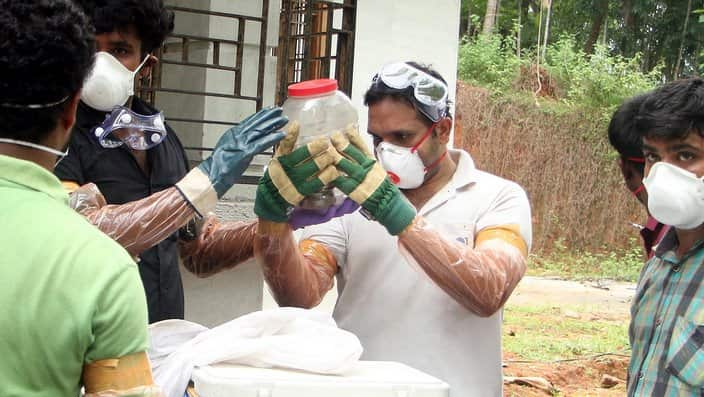A rare virus spread by fruit bats, which can cause flu-like symptoms and brain damage, has killed 10 people in Kerala, India.
The first cases were reported on Saturday in a family from Kozhikode. Two brothers in their late 20s and their aunt, 50, died from the virus, while their father, 56, remains on life support.
The latest victim is a 31-year-old nurse called Lini, who died on Monday after becoming exposed to the deadly virus while tending to a Nipah virus-infected patient.

India’s National Institute of Virology (NIV) has confirmed from the studies on blood samples that 3 out of the 4 deaths attributed to fever was caused by the virus.
Following the outbreak, the state government has set up a 24-hour control room and issued a statewide alert.
Kerala’s Chief Minister, Mr Pinarayi Vijayan said, “Though the virus has been reported only in Kozhikode, a statewide alert has been given to remain vigilant. A 24-hour control room has been opened to monitor the situation. CM has also requested all to follow the instructions of the health department to tackle this crisis.”
The Indian government has sent an expert medical team to the state while the government is closely monitoring the spread of the Nipah virus.
“Health department is doing everything possible to save the lives of the infected & prevent the advance of virus,” the Chief Minister said.
Symptoms of the infection include fever, headache, drowsiness, respiratory illness, disorientation and mental confusion. These signs and symptoms can progress to coma within 24-48 hours.
This virus can cause encephalitis or inflammation of the brain, the World Health Organization says.
The Centres for Disease Control and Prevention says, ‘transmission of Nipah virus to humans may occur after direct contact with infected bats, infected pigs, or from other NiV infected people.’
No vaccination is available for this virus which is on the priority disease watchlist of the World Health Organisation. The usual treatment is supportive care.
The government has urged the private hospitals to not turn down patients.
The virus was first detected in Malaysia in 1998, and India's eastern state of West Bengal has suffered two outbreaks in the last decade, killing 50 people, the WHO has said.
